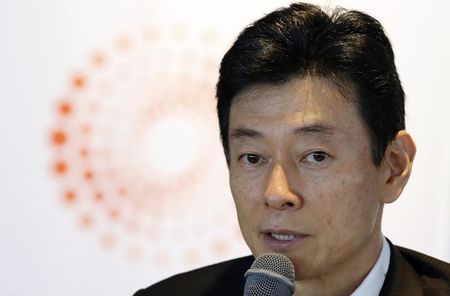By Tetsushi Kajimoto
TOKYO (Reuters) - Japan's government needs to be more cautious about a coming decision on raising the national sales tax than it was on the previous hike as the economy reaches a "make-or-break point," a senior government official said on Wednesday.
Vice Economy Minister Yasutoshi Nishimura told Reuters he was concerned that the drag on consumption from the April 1 tax hike is proving prolonged, saying the government stands ready to roll out fresh fiscal stimulus to support the economy.
Prime Minister Shinzo Abe is to decide around the end of the year whether to proceed with a plan to raise the tax to 10 percent next year after raising it to 8 percent from 5 percent in a bid to curb Japan's runaway government debt.
Nishimura said he hopes that the Bank of Japan would decide on further monetary easing as appropriate, adding that it is too early to debate exit from its massive monetary stimulus given that deflation has not been conquered yet.
"Our view on the economy's trend remains unchanged that it is making steady progress toward a 2 percent inflation target, in other words beating deflation," Nishimura told Reuters in an interview. "I'm very concerned about private consumption's trend in July and August ... It seems that the pullback in demand after the sales tax hike is being prolonged."
The Bank of Japan is likely to keep its bullish inflation outlook even as it cuts its economic growth forecast for this fiscal year in October, suggesting that the BOJ will not ease policy further at least until the end of 2014.
TAX HEADWINDS
The tax hike pushed the economy into its deepest slump in April-June since the March 2011 earthquake and tsunami, as consumption unwound from a surge earlier to avoid the higher tax rate. A recent run of soft data - including factory output and exports - has cast some doubt about the strength of an expected rebound in the current quarter.
Abe is due to decide in December whether to raise the sales tax to 10 percent in October 2015, after assessing the third-quarter GDP data and other indicators.
"Our basic stance is to raise. But I personally think more careful judgment will be needed than the previous one, because raising 5 percentage points over a year and half would deal a considerable blow to the economy," Nishimura said.
"The economy is at a make-or-break point on whether it could enter a virtuous cycle and return to sustained growth by overcoming the pullback in demand."
Nishimura flagged risks such as falling real wages, and sluggish exports despite a weakening of the yen.
Wages generally lag price rises by 1-2 years, and they are expected to increase over the coming year thanks to labour shortages and government efforts to intervene in labour negotiations between unionists and businesses, Nishimura said.
Given sluggish exports caused in part by structural changes - notably a shift of production overseas - Nishimura said Japan needs to pursue domestic demand-led growth by encouraging private-sector innovation through the "Third Arrow" of Abe's reflationary policies dubbed Abenomics.
But that does not mean that the first two arrows - monetary and fiscal stimulus - are no longer needed, Nishimura said, adding that it's too early to debate exit from the BOJ's stimulus.

"As for monetary easing ... I hope the BOJ would decide as appropriate ... we will also respond as needed with flexible fiscal policy ... we will always respond with three arrows."
(Additional reporting by Yuko Yoshikawa and Linda Sieg; Editing by William Mallard, Chris Gallagher & Shri Navaratnam)
